With a recent $1 million gift, Brent Martini, GABELLI ’86, has ensured that those efforts will grow exponentially.
“This will be, and can be, core to who Fordham is, in my humble opinion,” said Martini, a former president of the pharmaceutical firm AmerisourceBergen and current owner of vintage car dealer Martini Vintage LLC.
“I’m driven to make Fordham as great as it can be. I’m not sure why I take it so personally, I just believe there’s lots of good people doing good things, and I have the privilege of participating in it fully.”
Carey Weiss, director of the collaboratory, a university-wide initiative managed by the Gabelli School of Business, said Martini’s gift is the largest it has received to date, and is a bona fide game changer.
“It puts us in league with peer Changemaker Campus institutions around the world that have also been suitably resourced in ways that we have been emulating, and we can now express in our unique way.”
A Network of Changemakers
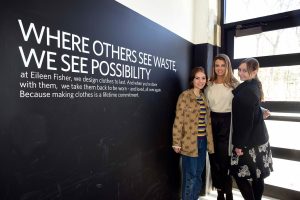
Weiss said the collaboratory was conceived by Fordham’s late provost Stephen Freedman in 2014 as part of the process for designation as an Ashoka U Changemaker Campus. In receiving that designation, Fordham joined a network of 25 other universities and colleges around the nation that are helping change the world through social innovation.
At the time, Ashoka’s review team expressed concern that Fordham had social impact projects happening everywhere, but lacked connectivity between initiatives. Weiss said the collaboratory takes all of that faculty and student thought leadership and turns it into practice, with measurable impact and outcomes for society.
The collaboratory’s programming, which was at the outset offered only to Gabelli School students, has in the last three years expanded to include students at Fordham College at Lincoln Center and Fordham College at Rose Hill students as well. And since 2015, faculty from five of the University’s colleges have participated.
Now, thanks to Martini’s generosity, the collaboratory is poised to expand to make an even greater impact.
Thinking about the Next Generation
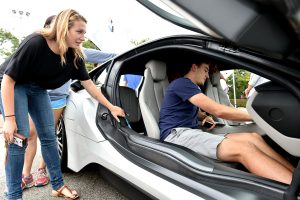
Martini previously funded the chair in global sustainability occupied by Gabelli School of Business professor James M. Stoner, Ph.D., and has served as executive in residence at the Gabelli School since 2015. He became interested in environmentally sustainable and inclusive business practices in 2011, when he decided to reenter the job market with COVE Financial Group, a lease-to-buy real estate business that he ran for four years. He credited Stoner, with whom he’d stayed in touch over the years, with bending his ear to talk about sustainability and social innovation.
“That’s kind of the way Jim’s always been with me. Give me something to think about, and then wait for me to think about it. This time around, he also had a hook, which was, ‘You have a young daughter, right? So while you’re building a new business, it would be appropriate to really think about the world that you’re creating, the business you’re creating, and the environment you’re impacting,’” he said.
“So, he really planted the seed around me to learn more about these topics.”
An example of an initiative the collaboratory has spearheaded is Sustainable Business Foundations, a course at the Gabelli School where students could, for their midterm, work in teams to identify a real-life problem for either BMW’s new fleet of electric vehicles or the city of New Rochelle, and design a sustainable solution. Social innovation has also been embedded in the Ground Floor, an introductory course that every first-year undergraduate student at the Gabelli School takes. And a new course, Impact Investing, was recently unveiled for junior and senior finance majors.
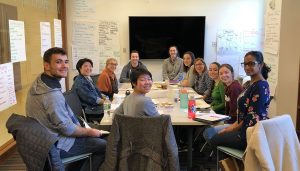
Weiss said Martini’s gift will allow the collaboratory to build out its infrastructure so it can serve other colleges and centers in the University. That includes more physical space that can accommodate students who want to plan events such as its Our Story gatherings, the second of which will be held Nov. 12. It will also increase opportunities for research and new coursework.
“With a better understanding of our own university, who the players are, and what the needs are, we can build this out to serve a much broader section of community,” she said.
“What we’ve needed is more funding for professional staff, for faculty involvement—particularly research and curriculum development—and also for student leadership.”
Eliminating Barriers
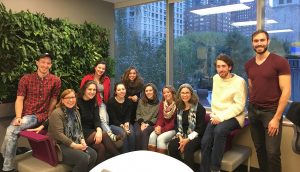
Weiss said part of the beauty of focusing on social innovation is that it provides a common theme on which seemingly disparate disciplines around the University can find common ground, allowing faculty and students to break out of the “silos” that are common in many large organizations. One initiative that the University will be launching soon is a GiveCampus Campaign, which will be spearheaded by the Fordham Fund, and will be dedicated to raising awareness and funds across all units of the university, including the collaboratory, for social innovation activities.
Martini said he’s excited to not only be a part of building out the collaboratory, but also to have a front row seat to the action. Although he lives in Laguna Beach, California, he visits New York City every five to six weeks, and says spending time with the students is the richest experience he has these days. Helping to provide them with innovative spaces to work in is his way of thanking them.
“I believe spaces are critically important, not just as symbols, but as places where people come together and do work. At any given student leader meeting today, you would see 25 kids jammed into a room,” he said.
“But you’d see a couple hundred kids if you could actually ask everyone involved in the social innovation collaboratory, in one shape or form, to all come to one space at one time. That, to me, is incredibly exciting. It’s just begun.”
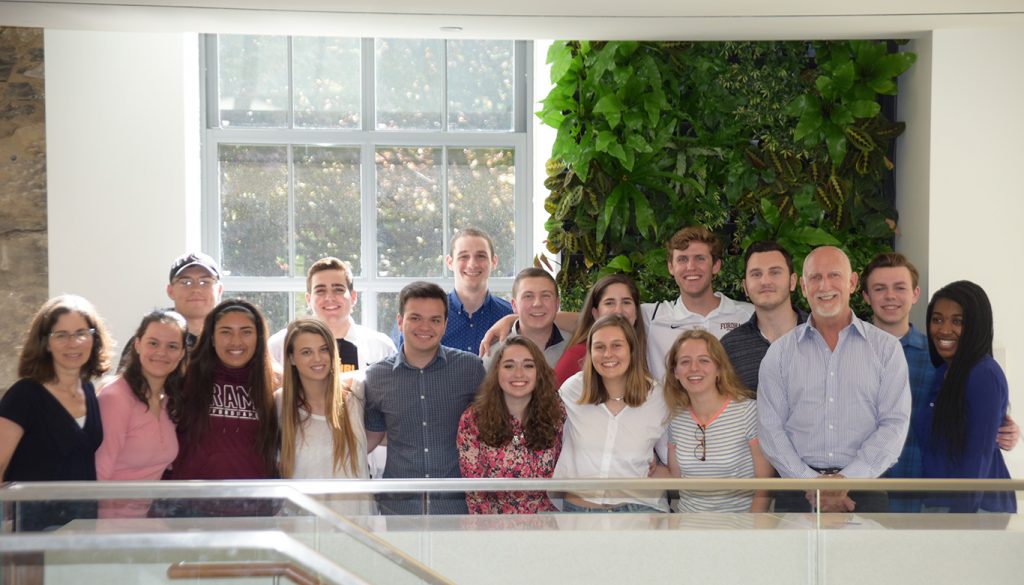
“This wire mill was in operation from 1848 to 1998,” Greenspan said in a November TEDxYouth talk she gave in Brookline, Massachusetts. The company that owned the site, Gilbert & Bennett Manufacturing, was innovative in its day. “They invented wire mesh there,” she said, which “allowed people to open up their windows with their new screens and enjoy the warm summer air without letting mosquitoes and other bugs inside their homes.”
Today, alas, the mill “lies derelict” and is classified as a brownfield site, contaminated by decades of metal manufacturing. “We’re not creating jobs, we’re not generating tax revenue, and we’ve really lost our heritage of the industrious working spirit that once existed there,” she said.
But where others see decay and waste, Greenspan sees potential.
A Sustainable Approach to Redevelopment
Five years ago, she and several other students responded to a call from local artist Jane Philbrick to examine ways to clean up and redevelop the site. What began as a high-school internship has become a vocation for Greenspan. With Philbrick, she is now a co-founder of TILL, a community-based real estate development company that is looking to transform the old site into a live-work space that would be anchored by artists and include commercial businesses, such as an indoor farm. And they’re aiming to do it in a way that can be applied to other brownfield sites throughout the country.
In addition to her usual coursework as a full-time economics major at Fordham, Greenspan spends hours each week studying real estate law, urban farming, phytoremediation, carbon storage, and other subjects with practical applications in an environmentally challenged world. “I find it very purposeful to work on this,” she says.
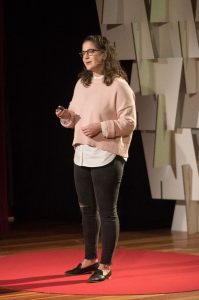
She points out that the built environment is “the largest contributor to global greenhouse gas emissions”—which is why she and members of her TILL team plan to use solar panels and heat pumps as part of their development model. But they aren’t letting carbon emissions embodied in the built environment off the hook, either.
“The steel and concrete we manufacture to pave over surfaces and build buildings emit many tons of CO2 into the atmosphere every year,” she said. “So the central question for our team became: Wouldn’t it be great if we could turn large-scale real estate development into sites for CO2 storage, as opposed to the carbon factories they currently are?”
She said they’re proposing to use plants to “capture excess carbon in our atmosphere,” and to build new structures with cross-laminated timber, a type of engineered wood that, like all wood products, can store atmospheric carbon.
A Campus Thought Leader
At Fordham, Greenspan is president and co-manager of St. Rose’s Garden, a community plot near Faculty Memorial Hall, and she’s a student leader in the Social Innovation Collaboratory, a group of faculty, students, and administrators who promote social entrepreneurship.
Carey Weiss, the director of sustainability initiatives at Fordham, describes Greenspan as “an outstanding student thought leader,” someone who “leverages her coursework and outside interests to continually seek new ideas and methodologies for creating a better society.”
Greenspan is grateful for the “supportive network of thoughtful, interdisciplinary thinkers” at Fordham. Studying economics has aided her immensely in her work with both TILL and the collaboratory, she said.
“I am not naturally inclined to think about economic policy. But my classes have forced me to consider other perspectives, to view a problem from many different angles.”
Looking beyond graduation, Greenspan’s heart—and head—are with TILL.
“What began as a problem specific to my community in Connecticut has transformed into a solution that can be applied globally to slow down climate change,” she said in her TEDxYouth talk. “There are 2 to 3 million brownfields in the U.S. alone. What if we turned every one of these brownfields into economically productive carbon storage sites? That is a world I want to live in.”
—Maureen Mackey, FCRH ’81
Watch Olivia Greenspan’s TEDxYouth talk
]]>
The funding will allow the two schools to develop courses and workshops at the intersection of business and law—fields that are inextricably connected in the real world. It will also expand the Fordham Foundry—Fordham’s small business incubator—to the Lincoln Center campus.
“The world is multidisciplinary—education cannot happen in silos,” said Donna Rapaccioli, PhD, dean of the business school. “To be successful in just about any career, you have to be able to consider things from multiple angles. Our hope with this grant is that both business and law students can take advantage of these resources and networks.”
The Foundry’s new Manhattan location will generate internships, Rapaccioli said, and help students at both schools to understand the legal and entrepreneurial aspects of launching a business.
“We are delighted that the Nasdaq grant will support the collaborative efforts of the law school and Gabelli School,” said Matthew Diller, dean of the Fordham School of Law. “It will provide important, practical opportunities for law and business students to learn about entrepreneurship—and how the tools of entrepreneurship can advance social justice.”
The grant marks another milestone in an ongoing relationship between Nasdaq and the Gabelli School, Rapaccioli said. This spring, Nasdaq’s educational exchange program brought Fordham students to its entrepreneurship center in San Francisco for 10 days of workshops, Silicon Valley corporate site visits, and networking.
The business school received a second grant early this summer. Coordinated by Greer Jason-DiBartolo, PhD, senior assistant dean for undergraduate studies, and Carey Weiss, director of sustainability initiatives, the $480,000 grant from Verizon Corporate Resources Group funded an on-campus entrepreneurial experience for high school students from under-resourced neighborhoods around the United States.
In the three-week-long program, students lived in Rose Hill campus dorms and attended workshops with Gabelli School faculty and visiting professionals. They also traveled into Manhattan for on-site visits at companies.
“The program offers a window into not only what the business world is like, but also what college life is like,” Rapaccioli said. “Some of these high school students would be first-generation college graduates, and the idea of the program is to inspire them to want to go to college. It’s allows us at the Gabelli School to play a small role in potentially transforming these young people’s lives.”
]]>The annual Bronx Summit on Technology Innovation and Start Ups explores the opportunities and challenges underlying the Bronx’s potential for technology-based innovation and startup activity. Sponsored by the Center for Digital Transformation, the summit—which is now in its fourth year—focuses on leveraging existing resources in the borough to promote economic development.
“The Bronx has good infrastructure, it’s relatively low-cost, and yet nobody focuses that much on it,” said the center’s director Wullianallur “RP” Raghupathi, PhD, professor of information systems.“Through these conferences, we want to build up the skills and the knowledge base we already have here to promote economic and technological development… and make it attractive for entrepreneurial and business activities.”
The summit is free and open to the public, but RSVP is required.
This year’s theme, “Opportunistic Growth for the Bronx in Technology: Next Step—Is the Bronx Up to the Challenge?”, pays special attention to health care technology. Speakers and panelists will discuss innovative solutions such as hosting health hackathons in which students and other programmers collaborate on building mobile applications.
Examples of what could arise from a health hackathon are remote monitoring for diabetics and “telemedicine” web conferencing for doctors and patients, Raghupathi said. But first the borough must tap into the brainpower within its borders.
“We have all these institutions, colleges, and this support from the borough president’s office as well as private entities,” he said, referencing Bronx Community College, St. Barnabas and Montefiore hospitals, the Bronx Science Consortium, and the South Bronx Development Corporation, among others. “We felt that we needed to act as an interface among these various stakeholders.”
Fordham presenters include Rosemary Wakeman, PhD, director of the urban studies program; Nisha Mistry, director of the Urban Law Center; and Carey Weiss, sustainability initiatives coordinator for the Social Innovation Collaboratory.
The summit is co-sponsored by Fordham’s urban studies program, the Urban Law Center, and the Bronx Technology Innovation Coalition (BITC).
For more information, contact Raghupathi or Center for Digital Transformation senior fellow Teresita Abay-Krueger.
]]>Through the partnership, students in a new academic course and a complementary practicum—both focused on sustainability and funded by BMW—will work in teams to enhance features of BMW’s new fleet of electric vehicles, the i3 and i8 series. The students will then have the opportunity to share their ideas with BMW representatives.
“Students have a natural understanding about products [like BMW-i]. We don’t need to explain to them what an electric vehicle is and why it’s needed—they all get it,” said Tadhg O’Connor, BMW-i area manager for the Eastern region, during a visit to the Rose Hill campus.
“They’ve grown up consuming these products and they’re used to thinking about how to integrate them into our cities. Their intuition is very valuable to us.”
Carey Weiss, sustainability initiatives coordinator and the instructor for the Social Innovation Practicum, said that the students’ inherent awareness of sustainability is apparent even in these early weeks of the practicum, which is open to both undergraduate and graduate students on all Fordham campuses.

Regarding urban mobility, “Our younger students have brought up the fact that they may never own their own car and have instead talked about ideas like group shares of cars—entirely different models for ownership,” Weiss said.
“These are issues that other generations might not see, but to these 20-year-olds they’re front and center.”
The fact that this generation of college students is immersed in an increasingly urban and sustainably minded society makes partnering with a university ideal, O’Connor said. Fordham is an especially good partner in these efforts, he added—in addition to being designated an AshokaU Changemaker Campus, Fordham has an established a history of operating sustainably, such as prioritizing energy efficiency and powering the Ram Van fleet with bio diesel fuel.
In addition to the practicum, the partnership with BMW underwrites a new academic course, Sustainable Business Foundations, which provides students with a panoptic view of the efforts to make businesses and communities beneficial for “planet, people, and profit” alike.
“The course gives students a perspective on the current challenges related to sustainability, things like urban mobility, infrastructure, food, and public policy,” said course instructor Michael Pirson, PhD, an associate professor of management systems.
“It also helps them gain a keener awareness of the environment—natural as well as social and political—which they’ll need to respond to in whatever career they choose.”
For their midterm projects, students in the class will work in teams to identify a real-life problem for either BMW or the city of New Rochelle, New York, and design a sustainable solution. So far, students have floated ideas about making charging stations for electric vehicles more common and developing smartphone technology that allows drivers to remotely check how much further they can travel before needing a charge.
“We’re trying to change the way we educate not only through academic rigor, but also through applications—providing real-life challenges that we need to figure out and that the students can work on,” Pirson said.
]]>